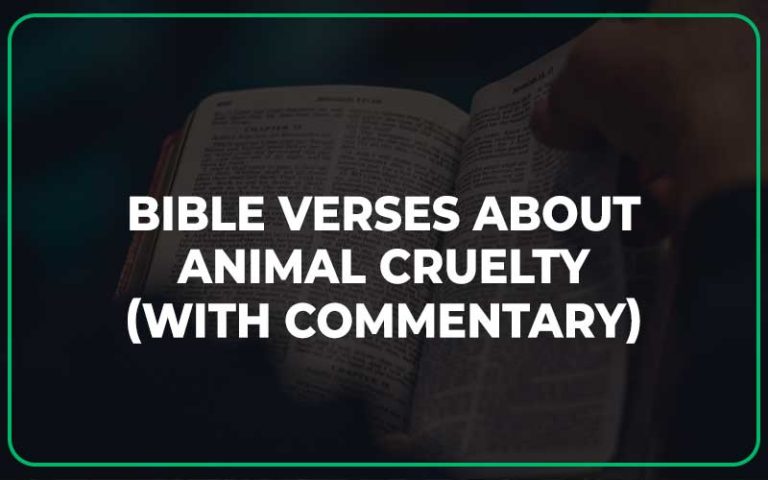Throughout history, religious texts have served as perennial guides, providing moral frameworks and ethical considerations regarding the treatment of both humans and animals. As we delve into the Scriptures, a common inquiry arises: how many verses in the Bible address the issue of animal cruelty? While some may perceive this as an irrelevant question, a closer examination reveals a profound tapestry of faith, ethics, and responsibility towards all of God’s creations.
The Bible, a venerable anthology revered by billions, comprises an extensive array of verses that espouse compassion and stewardship over the natural world. Within its pages, it becomes apparent that the divinely inspired writings reflect a conscientious sentiment regarding the treatment of animals. Yet, the specific terminology of “animal cruelty” may not be explicitly employed; rather, the implicit themes woven throughout the text elucidate a moral obligation towards non-human life.
To begin our exploration, it is essential to highlight some prominent verses that resonate with the ideals of kindness and protection toward animals. One significant verse is found in Proverbs 12:10: “A righteous man cares for the needs of his animal, but the kindest acts of the wicked are cruel.” This poignant statement not only affirms the intrinsic value of animals but also delineates the moral character of individuals based on their treatment of creatures. It compels believers to reflect on their ethical beliefs regarding animal welfare.
Moreover, the theme of compassion persists in passages like Exodus 23:5, which states, “If you see the donkey of someone who hates you falling down under its load, do not leave it there; be sure you help them with it.” This directive underscores not only an obligation to assist but also highlights the interconnectedness of community and responsibility. The underlying message calls for empathy, urging individuals to act benevolently, regardless of personal feelings or grievances.
As we engage with these verses, it becomes evident that the Bible serves as a reservoir of wisdom, urging readers to embody kindness and exhibit moral responsibility. However, one must ponder the far-reaching implications of these teachings. What contributes to the fascination with biblical perspectives on animal welfare? Perhaps it stems from an innate desire to comprehend the ethical constructs within our faith, continually searching for alignment between spiritual beliefs and actions in the material world.
Furthermore, the account of Noah’s Ark presents a vivid tapestry of divine protection over animals. The narrative illustrates God’s intentionality in preserving every species, encapsulating the profound sanctity of life. In Genesis 6:19-20, the Lord commands Noah, “You are to bring into the ark two of all living creatures, male and female, to keep them alive with you.” This emphasis on inclusivity and divine concern for all creatures unveils a broader understanding of humanity’s role as stewards, custodians tasked with ensuring the well-being of the Earth’s inhabitants.
The concept of stewardship extends beyond the realms of merely upholding physical care for animals. It invokes a sense of deeper ethical responsibility that resonates with the core values of many faith-based teachings. The interconnectedness between human beings and the natural world necessitates an examination of our ethics, compelling us to confront uncomfortable truths regarding the prevailing practices that lead to animal cruelty.
Despite the considerable focus on the biblical verses that champion animal welfare, the inconsistency of human behavior often contradicts these principles of compassion. This discord underlines a sociocultural phenomenon where faith and ethics are sometimes at odds with everyday practices. Such contradictions can spark passionate debates on the morality of certain industries, specifically those rooted in animal exploitation, raising questions about our ethical obligations.
It is imperative to consider the interpretation of biblical passages in the context of modernity. The theological implications associated with animal treatment require introspection and reevaluation, particularly in light of contemporary issues pertaining to factory farming, animal testing, and habitat destruction. Just as the Israelites were instructed to be stewards of the land, present-day believers are called to advocate for policies that promote animal rights and secure ecological balance.
Additionally, historical narratives pertaining to animal sacrifices invoke another layer of complexity. While the practice served an ancient ritualistic purpose, it also challenges modern believers to reconsider their relationship with animals. In contrast, the New Testament emphasizes values of mercy and compassion, exemplified through Jesus’ teachings. His messages frequently align with care for the marginalized, encompassing not just human concerns but also extending to creatures who lack a voice.
Ultimately, the inquiry into the number of biblical verses addressing animal cruelty is less about quantification and more about the qualitative essence of these teachings. The verses serve as an ethical guidepost, urging adherents to reflect deeply on the moral implications of their actions. As individuals seek to harmonize their beliefs with their interactions with the natural world, the timeless wisdom contained within Scripture continues to resonate.
In closing, the Bible does indeed provide a plethora of insights into the ethical treatment of animals, urging believers to practice empathy and compassion. The fascination surrounding this topic does not merely lie in the number of verses but in the powerful moral imperatives they evoke—an urgent call to recognize our role as caretakers of creation and advocates against cruelty. As the world becomes increasingly aware of animal rights, the teachings of Scripture remain profoundly relevant, seeking to inspire a more humane and compassionate future for all living beings.








